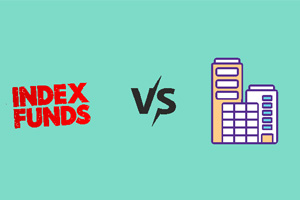Finding the best option in a world of endless choices can sometimes feel like a puzzle. Whether choosing your morning coffee or deciding on a career, you encounter numerous possibilities daily. This is true for investing as well. With so many ways to invest money, it can feel overwhelming to pick the right one. Like other important decisions, selecting between investment options requires a closer look. In this article, we will explore the ins and outs of index funds vs large-cap funds to understand their role in a diverse investment strategy.
What are Index Funds?
Index funds are a type of mutual fund scheme that replicates a benchmark index. These funds invest in the same securities and in the same proportions as the index's portfolio. In compliance with the Securities and Exchange Board of India (SEBI), index funds must have a minimum of 95% investment in the securities of a specific index.
Now let’s move to the second mutual fund scheme.
What are Large-cap funds?
Large-cap funds are open-ended equity funds that invest in companies with significant market capitalisation. In accordance with the rules laid down by SEBI, large-cap companies are those ranked from 1st to 100th based on their market capitalisation. Large-cap funds allocate a minimum of 80% of their assets to equity and equity-related instruments of large-cap companies.
Note - Market capitalisation indicates the total market value of a publicly traded company's equity.
Along with understanding what the index and large-cap funds are, it is also essential to understand their differences.
Index funds vs large-cap funds – differences explained
- Management style
A major difference between the two mutual fund schemes is in how they are managed. Large-cap funds are actively managed by fund managers. These professionals aim to pick suitable investment securities and change the allocation over time to ensure the fund does well. On the other hand, index funds follow a passive style. They replicate the performance of a particular market index. There is no room for the fund manager to alter the composition based on their judgment.
- Risks
Mutual funds may carry different types of risks. Two of these include systematic and unsystematic risk. Systematic risks are the big risks that impact the entire financial market, like when the economy is struggling. On the other hand, unsystematic risks are more about specific things that can go wrong with a particular company or investment.
Large-cap funds can be more exposed to unsystematic risk because they rely on a fund manager to make investment decisions. Since professionals do not actively manage index funds, there's less chance of unsystematic risk. However, both types of funds can be exposed to systematic risk.
- Expense ratios
Index funds tend to have lower expense ratios because they do not involve a lot of active decision-making by the fund manager. They simply follow a benchmark and create a similar portfolio of assets.
Large-cap funds are actively managed by fund managers and may have higher expense ratios. The fund manager spends more time and effort deciding which stocks to buy or sell. Hence, the scheme may charge a higher fee to cover these operations.
- Taxation
Both large-cap funds and index funds are subject to similar tax rules. If you hold onto your investment for less than 12 months, any profits you earn will be considered Short-Term Capital Gains (STCGs). You will pay an STCG tax of 15% on these gains.
If you hold onto the mutual fund units for over 12 months, the profits will be considered Long-Term Capital Gains (LTCGs). These are taxed at a rate of 10%. However, LTCGs up to Rs 1 lakh in a year are exempt from any tax. So, you will pay 10% tax only on gains exceeding Rs 1 lakh/year.
Conclusion
Deciding between large-cap and index funds requires considering your comfort level with their unique investment approaches. It is essential to consider which strategy aligns better with your preferences. Additionally, take into account the investment cost associated with both types of funds. These factors can play a significant role in making a well-informed investment choice that suits your financial goals and preferences.
An investor education initiative by Edelweiss Mutual Fund
All Mutual Fund Investors have to go through a one-time KYC process. Investors should deal only with
Registered Mutual Fund (RMF). For more info on KYC, RMF and procedure to lodge/redress any
complaints, visit - https://www.edelweissmf.com/kyc-norms
MUTUAL FUND INVESTMENTS ARE SUBJECT TO MARKET RISKS. READ ALL SCHEME-RELATED DOCUMENTS CAREFULLY
Trending Articles
MUTUAL FUND INVESTMENTS ARE SUBJECT TO MARKET RISKS, READ ALL SCHEME RELATED DOCUMENTS CAREFULLY.




















